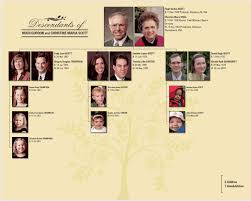记忆方法
记忆“descendant”这个单词,可以将其分解为“descend”(下降)和“-ant”(形容词后缀)。想象一个家族的成员从祖先那里“下降”到了下一代,这样“descendant”就表示后代或子孙。这种方法帮助你在词根和意义之间建立联系,从而增强记忆。
以上内容由AI生成, 仅供参考和借鉴
中文词源
descendant 后裔
来自descend, 下降。引申义后裔。
英语词源
- descendant
- mid-15c. (adj.), c. 1600 (n.), from French descendant (13c.), present participle of descendre (see descend). Despite a tendency to use descendent for the adjective and descendant for the noun, descendant seems to be prevailing in all uses and appears 5 times more often than its rival in books printed since 1900. Compare dependant.
权威例句
- 1. His design was a descendant of a 1956 device.
- 他的设计是从一个1956年的装置衍生而来的。
- 2. She is a direct descendant of Queen Victoria.
- 她是维多利亚女王的嫡系后代。
- 3. He was an O'Conor and a direct descendant of the last High King of Ireland.
- 他属于奥康纳家族,是爱尔兰最后一位君王的嫡系后裔。
- 4. a lineal descendant of the company's founder
- 公司创始人的直系后裔
- 5. He is a lineal descendant of the company's founder.
- 他是公司创始人的直系后裔。
